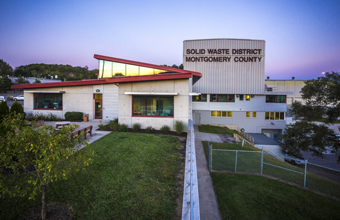College of Arts and Sciences Newsroom

Pay as You Throw
A University of Dayton student sustainability research project to encourage recycling and reduce landfill trash resulted in a proposed grant program to launch "pay-as-you-throw" waste management programs in Montgomery County, Ohio.
Now a second group of students is working with the Montgomery County Solid Waste District to develop an implementation plan to pilot pay-as-you-throw programs in two Dayton-area communities starting in 2019. The grant program will fund the pilots, pending Ohio Environmental Protection Agency approval.
“It really feels rewarding,” said senior Kaleigh Barkaszi from Cocoa Beach, Florida, who researched and wrote the pay-as-you-throw feasibility study with two other students during the spring 2017 semester.
“We didn’t just do all this research for nothing to come of it. They are taking what we said to heart and want to implement it,” she said.
Barkaszi, senior Ashlee Wertz, and alumna and graduate student Erin Peiffer ’17 developed the feasibility study in the Sustainability Research II course, which assigns students to work with community partners on in-depth, group research projects related to sustainability issues in the Dayton area. Offered each spring, the course is part of the College of Arts and Sciences’ sustainability, energy and the environment minor.
The students looked at pay-as-you-throw programs in urban, suburban and rural areas across the U.S. to help county solid waste district officials determine how such programs might work in Dayton-area communities. They also compiled data on the types and amounts of trash being generated by Montgomery County households, as well as how it is collected and managed, to determine how much could be recycled and removed from the waste stream before going to local landfills.
Also known as volume-based disposal, pay-as-you-throw programs create a direct economic incentive to recycle by treating waste collection services like other utilities. Instead of paying a fixed fee, regardless of the amount of trash they generate, households pay a variable rate, based on the volume of trash collected.
“There is a cost-savings associated with this by recycling more and throwing away less,” said John Woodman, a Montgomery County Solid Waste District community program specialist, who worked with the students. He said the University partnership also saved the county money, because they did not need to contract with an outside agency for research studies and plan development.
The students presented their research to the waste district’s policy committee at the end of the semester. Their findings were included in the district’s five-year strategic plan, which has been submitted for approval to the Ohio EPA. The plan includes the implementation of pay-as-you-throw programs in Montgomery County, as well as the district-funded grant program to help communities cover startup costs for containers and other volume-based disposal-related equipment.
Woodman is now working with three new Sustainability Research II students — sophomore Kelly Hines, senior Cody Ruffing and senior Alexander Wolf — to build on the momentum of last year’s project.
“We’ve tasked the students this year with developing an implementation plan for two selected communities in the county,” he said. “They are going to be working with us, public works directors and township administrators to actually take that general research and feasibility study that we did last year and implement specific proposals in these two communities.”
Getting buy-in from residents is one of the biggest obstacles to implementing pay-as-you-throw programs, said Kelly Bohrer, director of community engaged learning in the University’s Fitz Center for Leadership in Community.
Bohrer co-taught the Sustainability Research II course in spring 2017 with Daniel Fouke, philosophy professor emeritus. This semester, she is co-teaching the course with Steve Bein, assistant professor of philosophy.
“It is better if the community understands where this is coming from and how it is going to be beneficial,” Bohrer said. “There has to be an awareness campaign and education around it, so the students will also be making recommendations this semester about how residents might be informed about the program.”
Barkaszi, an international studies major with a sustainability, energy and the environment minor, is now spearheading a campus composting effort as a student leader in the University’s Hanley Sustainability Institute. She is pleased to see her pay-as-you-throw research continue with new students and make a positive impact on the community.
“It’s a good partnership,” Woodman said. “We are very pleased with how it turned out last year. It was useful for us in our work professionally and we anticipate it will be that way again this year.”
- Dave Larsen, communication coordinator, College of Arts and Sciences
